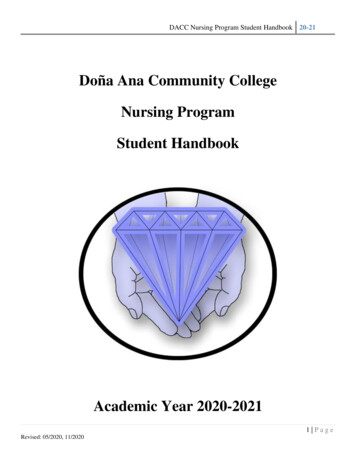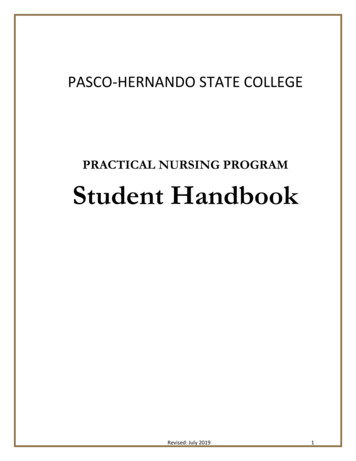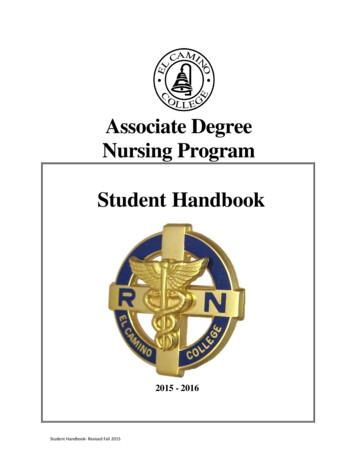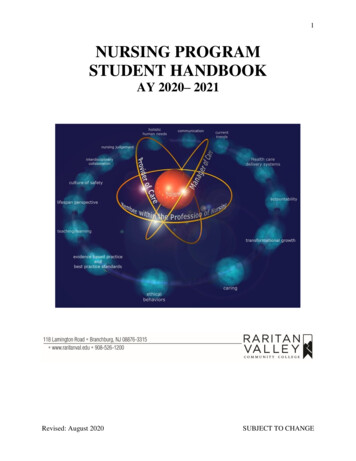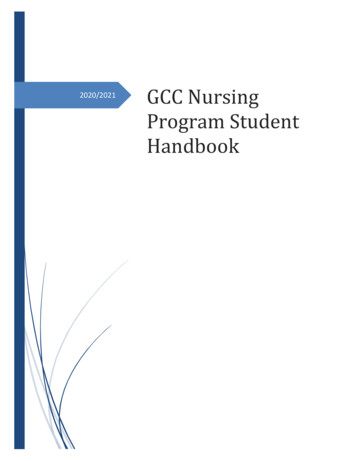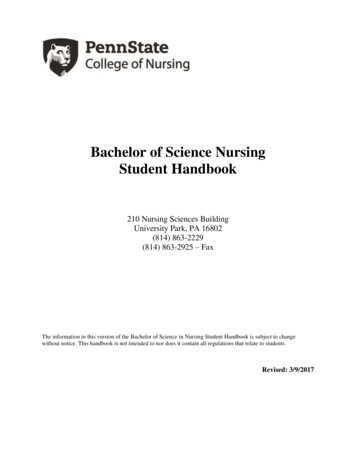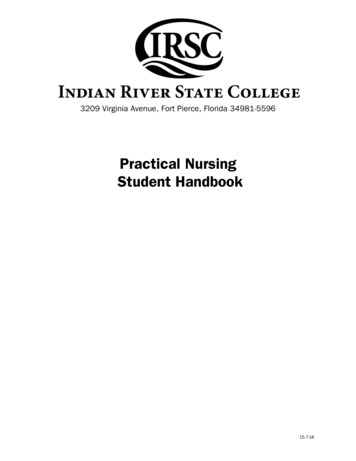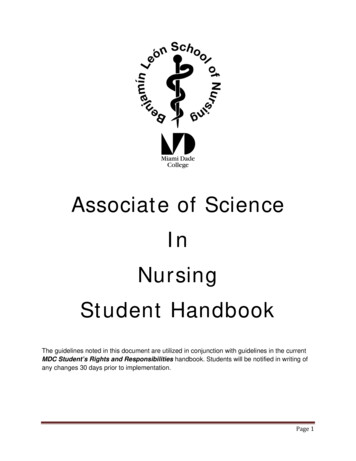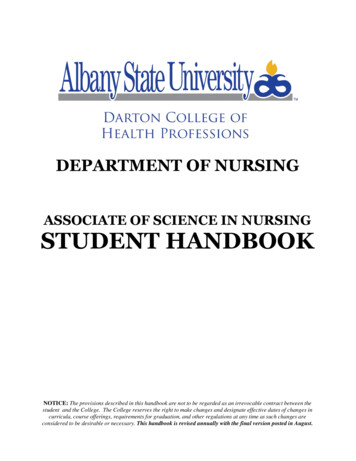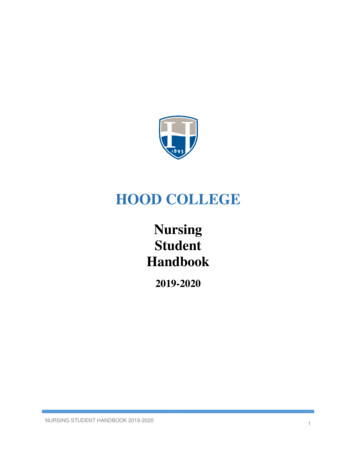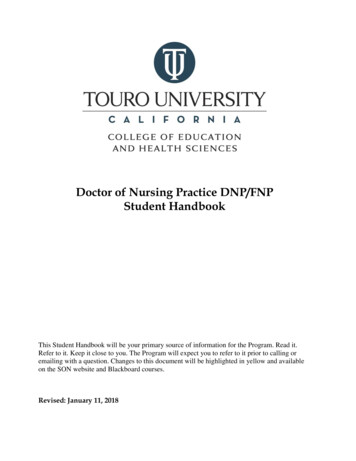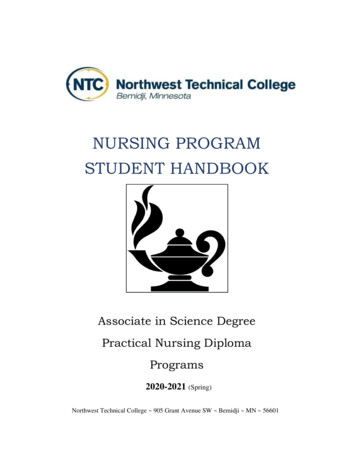
Transcription
NURSING PROGRAMSTUDENT HANDBOOKAssociate in Science DegreePractical Nursing DiplomaPrograms2020-2021 (Spring)Northwest Technical College 905 Grant Avenue SW Bemidji MN 56601
TABLE OF CONTENTSContentsINTRODUCTION . 2HANDBOOK DISCLAIMER . 2EQUAL OPPORTUNITY AND ACCESSIBILITY . 3HISTORY OF THE BEMIDJI NURSING PROGRAMS . 4ORGANIZATIONAL CHART for NORTHWEST TECHNICAL COLLEGE . 6MISSION, VISION, and CORE VALUES . 7PROGRAM APPROVAL, ARTICULATION, and ACCREDITATION . 7CORE VALUES (Philosophy) . 8NTC PROGRAM FRAMEWORK . 10STUDENT POPULATION . 10ROLE OF THE NURSE . 10NTC STUDENT LEARNER OUTCOMES . 11NTC NURSING FACULTY COMMITTEES . 12PROGRAM POLICIES . 13COURSE/SEMESTER PROGRESSION . 24PROGRAM EVALUATION . 25ACADEMIC EVALUATION OF NURSING COURSES . 25LICENSURE INFORMATION . 32PROGRAM DEFINITIONS . 33STUDENT SUCCESS FACTORS including Studying Hints . 36CLINICAL/PROGRAM ELIGIBILITY TRACKING (Updated 1/2021) . 38TECHNICAL STANDARDS FOR ENTRY-LEVEL NURSING PROGRAMS . 39SOLUTION AND APPEALS PROCESSES . 431
INTRODUCTIONWelcome to Northwest Technical College (NTC) and the Nursing major. Nursing is a career rich in satisfaction,opportunities, and challenges. This handbook is intended to provide student information related to program policies andprocesses. Nursing faculty/advisors and course syllabi also serve as a source of program information. College policies canbe located in the online College Handbook and College Catalog (www.ntcmn.edu), and Student Services personnel.The faculty and administration of the Associate of Science Nursing Degree (AD) and Practical Nursing (PN) Diplomaprograms at Northwest Technical College (NTC) have prepared the Nursing Program Student Handbook for student andfaculty use. It addresses the general information, policies, and standards necessary to maintain an effective and efficientnursing education program. Students are held responsible for being informed of all nursing policies.HANDBOOK DISCLAIMEREvery effort is made to ensure the accuracy of the material contained in this Handbook. All policies, procedures, clinicalinformation/documentation, program information, and fees are subject to changes at any time by appropriate action of thefollowing parties: nursing faculty, college administration, Dean of Nursing and Human Services, Minnesota StateColleges and Universities (Minnesota State System and System Board of Trustees), Minnesota Board of Nursing, and/orMinnesota Legislature without prior notification.This handbook is neither a contract nor an offer to make a contract. While every effort is made to ensure the accuracy of theinformation enclosed, the Handbook is updated as necessary. NTC reserves the right to make changes at any timeconcerning course offerings, degree requirements, services, policies, or any other subject addressed in this document. Theinformation enclosed is provided solely for the convenience of the students and readers.This handbook supersedes all previous versions of the Handbook. Students are accountable for familiarizing themselveswith its contents and for compliance with the policies and procedures contained within. Changes made between years arenoted in the handbook with the month and year of change or addition.When a change is adopted into the handbook during an academic year, students will be emailed the change. Facultymay also include the change in the syllabi and/or highlight the change in D2L BRIGHTSPACE. This is consistent withNTC Nursing’s goal of improved communication and follow-through.The listing of general NTC policies may be found using the following link: STUDENT student-life/handbook-policies/Graduation does not guarantee successful passing of NCLEX or licensure by the Board of Nursing.Updates to the 2020-2021 Spring Nursing Program Student Handbook were the combined efforts of the entire NursingDepartment. Completion date: January 11, 20212
EQUAL OPPORTUNITY AND ACCESSIBILITYNTC is committed to a policy of nondiscrimination in employment and education opportunity. No person shall bediscriminated against in the terms and conditions of employment, personnel practices, or access to and participation inprograms, services, and activities with regard to race, sex, color, creed, religion, age, national origin, disability, maritalstatus, status with regard to public assistance, sexual orientation, or membership or activity in a local commission as definedby law. Inquiries regarding compliance, rights and other information may be addressed to the Equal Opportunity &Affirmative Action office: (218) 755-4121.BSU/NTC is committed to making all educational programs, course materials, services and activities sponsored by theCollege accessible to individuals with disabilities. Students requesting accommodations due to a disability or other need foraccess should contact Accessibility Services as soon as possible. Accessibility Services is located in Decker Hall Room 202at BSU and Room 203 at NTC. PH: 218.755.3883 (BSU), or 218.333.6656 (NTC) or email:accessibility@bemidjistate.edu. This information is also available through Minnesota Relay Services at 800.627.3529.3
HISTORY OF THE BEMIDJI NURSING PROGRAMSThe Northwest Technical College (NTC) Bemidji Campus Practical Nursing Program began in 1966 under the direction andthrough the efforts of Mr. Jake Outwin and Mrs. Sarah Robinson in addition to other community leaders. The first classenrolled 16 students, and through the years clinical sites ranged from Bemidji to Minneapolis. The Bemidji Campus wasinitially called the Bemidji Area Vocational Technical Institute and has undergone some name changes as the campusevolved. Effective July 1, 1992, Bemidji Technical College merged with five other northern Minnesota vocational ortechnical colleges to become Northwest Technical College, or “the Six Pack” as it became known. Campuses included ThiefRiver Falls, East Grand Forks, Detroit Lakes, Moorhead, Wadena, and Bemidji. In July of 1995, NTC formally withdrewfrom the six pack to become its own entity, retaining the name of Northwest Technical College (NTC). In that same year,NTC became part of a new Minnesota State Education System, the Minnesota State Colleges and Universities (MnSCU),now called Minnesota State.Many changes in the nursing curriculum, along with the utilization of community agencies, have been made through theyears to accommodate the changing needs of students and the healthcare delivery system. In 1979, the Practical NursingProgram began implementing the present education articulation process through Agassiz Regional Nursing EducationConsortium (ARNEC), and in 1998, the program began offering an Associate of Applied Science in Practical Nursing(AASPN) in addition to the concurrently offered diploma in Practical Nursing. In the fall of 2000, this program became partof the single NTC Practical Nursing (PN) Program. The advent of the present Practical Nursing Diploma curriculum cameabout in 2014. This streamlined the program so students can earn their diploma and apply for LPN licensure in one year.The two Practical Nursing programs became one program with the Minnesota Board of Nursing on Jan. 1, 2014.In 2008, the Northwest Technical College nursing program introduced an Associate of Science in Nursing degree. Thisoption created an opportunity for Licensed Practical Nursing (LPN) graduates to obtain their associate degree. In the fall of2015, a new two-year Generic Associate Degree program was launched. The Associate Degree (AD) in the nursing programhas both campus and distance options whereas the Practical Nursing (PN) program has only a face-to-face option.Both the NTC Associate in Science Nursing Degree and Practical Nursing Diploma programs were approved for initialfive-year accreditation from the Accreditation Commission for Education in Nursing (ACEN) in September 2019. Initialaccreditation date: June 30, 2017. Spring of 2024 is the next site visit.NTC is aligned with Bemidji State University under the controlling body of Minnesota State System. NTC is theofficial controlling body of the Nursing Program.4
ORGANIZATIONAL CHART for NORTHWEST TECHNICAL COLLEGENursing DivisionPresident of Bemidji State University and NTCDr. Faith Hensrud, Ed.D.Vice President of Academic Affairs for NTCMr. Darrin Strosahl, MSDean of Nursing and Human ServicesMichele D. Brielmaier, MSN, RNNursing FacultyAshley Anderson, Karen Bierman, Stacy Cederstrom,Chelsey Erickson, Lindsay Gray, Shari Hahn,Brenda Henriksen, Nicole Larson, Jennifer Morehart,Emily Piller, Shannon Swanson,and Loretta VobrNursing Assistant FacultyBarb Breeze, Shelley Cloose, Andria RaynbirdNursing Program TechnicianSandy Thole6
MISSION, VISION, and CORE VALUESMission Statement for NTC (Approved June 2019)Northwest Technical College engages, supports, and prepares students for rewarding careers throughinnovative programs and hands-on learning.Vision Statement for NTC (Approved June 2019)Northwest Technical College will be a regional leader in providing accessible and innovative education to meet theevolving needs of our diverse students, communities, and workforce.Core Values for NTC (Approved June 2019)Our students, faculty and staff strive for: Excellence – focus on quality and continuous improvement. Integrity – earn trust by doing what we say we will do; ensure high professional and ethicalstandards. Inclusion – provide an atmosphere of respect, sense of belonging, dignity, and acceptance of all. Student Success – provide access and educational opportunities for personal and professional growth. Innovation – deliver creative and future-oriented career and technical programs. Community Engagement – develop strong collaborative relationships with education, business, andindustry to meet regional needs.NTC Core Abilities1. Effective communication and interaction skills2. Critical thinking and active learning3. Mathematical Skills4. Career/Self-development5. Technology6. Global/Multicultural awarenessMISSION STATEMENT for NTC NURSING PROGRAMSThe mission of the Nursing Program is to educate diverse students to become quality entry-level healthcareteam members who provide compassionate, culturally sensitive, holistic care in a variety of settings. Duringthis process, students undergo a transformation where a spirit of inquiry, collaboration, resourcefulness, andprofessional identity are nurtured.PROGRAM APPROVAL, ARTICULATION, and ACCREDITATIONBoth the Minnesota State College and University system (Minnesota State) and the Minnesota Board ofNursing (MBON) must provide approval of the NTC Practical Nursing (PN) Diploma and Associate ofScience in Nursing Degree (AD) programs.Program graduates earn either a PN diploma or an associate of science degree and are eligible for licensureupon the successful completion of the National Council of Licensure Examination (NCLEX). The stateboard sets and regulates standards and provides approval of the nursing school curriculum designed totrain nursing students to be eligible to sit for the NCLEX. Program approval is granted every year whenthe annual compliance report meets state board requirements.PN graduates may apply to the NTC LPN Step-In program to complete the associate of science degree afterthey have obtained their license as an LPN. For AD graduates, the program has an articulation agreementwith Bemidji State University, as well as six other four-year Minnesota State universities, for continuingseamless education to their Baccalaureate Degree.7
Institutional AccreditationThe Commission on Institutions of Higher Education of the North Central Association of Colleges andSchools (HLC) approves NTC for accreditation.Higher Learning Commission30 North LaSalle Street, Suite 2400Chicago, IL 60602Phone: (800) 621-7440Nursing AccreditationBoth the NTC Associate in Science Nursing Degree and Practical Nursing Diploma programs wereapproved for initial five-year accreditation from the Accreditation Commission for Education in Nursing(ACEN) in September 2019. Initial accreditation date: June 30, 2017. Spring of 2024 is the next site visit.More information can be found at www.acenursing.org.Accreditation Commission for Education in Nursing33423 Peachtree Road NE, Suite 850Atlanta, GA 30326Phone: (404) 975-5000CORE VALUES (Philosophy)The Nursing philosophy at NTC is designed to define the meaning of the program’s core values: caring,diversity, ethics, excellence, holism, integrity, and patient-centeredness. We value the role the programplays in the progressive development of the student. We believe our graduates must be equipped to thinkcritically, adapt to dynamic environments, and embrace new learning to shape nursing practice.We believe caring: is a socially significant force fundamental in fostering concern and consideration for the comfort,well-being, and safety of the whole person promotes health, healing, and hope for vulnerable individuals in need explores all possibilities to understand the unique needs of individuals, families, and communitiesWe believe diversity: includes not only ways of being but also ways of knowing involves understanding ourselves and each other to recognize the uniqueness of individuals includes cultures, values, and beliefs that are unique and valued with respect and dignityWe believe ethics: demonstrates conduct reflective of personal and professional moral values requires a systematic process and accountability in decision-makingWe believe excellence: strives for progressive transformation while embracing opportunities for enhancing knowledge,practices, and outcomes challenges understood and expected norms to seek improved processes in establishing best practicesWe believe holism: is complex, involving interrelationships among physical, psycho-social, and spiritual elementsof the individuals, families, or communities within the health-illness continuum inculcates values, beliefs, and practices that are unique and respected8
We believe integrity: is honesty and strength of character, essential to building and maintaining all human relationships is having the humility to understand how actions directly impact others is consistent adherence to moral and ethical principlesWe believe patient-centeredness: is an orientation to care respectful of and responsive to individual patient preferences and needs,ensuring patient values guide all decisions involves creating a culture that accepts uniqueness of people through all levels of careThe philosophy of the Nursing Program incorporates the core values of the program’s theoretical frameworkadapted from the National League for Nursing (NLN, 2010).NLN Education Competencies Model: NTC Nursing Program Theoretical FrameworkNational League for Nursing. (2010).Outcomes and competencies for graduates of practical/vocational, associate degree, baccalaureate, master’s,practice doctorate, and research doctorate programs in nursing (p. 10).9
NTC PROGRAM FRAMEWORKPhilosophy Foundation for the AD and PN Nursing ProgramsConcepts and Definitions Student Learning OutcomesCompetencies andApprenticeshipsCourse OutcomesActivities and MeasurementsEvidence-basedMeet National StandardsFlow from Philosophy StatementEvidenced-basedMeet National StandardsEach Student Learning Outcome corresponds to a conceptDeveloped for each Student Learning OutcomeThree Apprenticeships integrated into the competencies:Knowledge, Skills/ Practice Know How Attitude/EthicalComportment Correspond to the competencies and apprenticeships Developed to measure each course outcomeSTUDENT POPULATIONStudents in the Nursing Programs include various cultures and ethnic origins. Beginning students must havea high school diploma or high school equivalency. Persons interested in nursing should have a genuineinterest in people. It is necessary to possess the physical capability to care for persons requiring assistancewith personal care and to possess the mental, physical, and emotional capability to provide holistic nursingcare and monitoring. Students must have a knowledge base of the human body and be able to apply it toclient care, drawing from an educational background in the sciences, math, psychology, and nursing.Individuals interested in nursing are active learners with a personal commitment to lifelong learning. Thosewho pursue this career must value working collaboratively with colleagues in a variety of
In the fall of 2000, this program became part of the single NTC Practical Nursing (PN) Program. The advent of the present Practical Nursing Diploma curriculum came about in 2014. This streamlined the program so students can earn their diploma and apply for LPN licensure in one year. The two P
